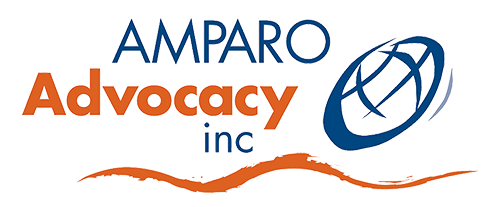CALD NDIS Symposium, 11 October 2016
AMPARO partnered with Griffith University to present a one day symposium exploring what is needed to ensure CALD people with disability and their families have equitable access to the NDIS. This was held in Brisbane on the 11 October, 2016.
Building the capacity of CALD communities to include people with disability and their families in community, 2016
AMPARO Advocacy worked with bicultural workers from four communities to explore ways of both increasing inclusion of people with disabilities and their families within these, and reducing stigma and myths around disability.
These communities were:
- Burmese community in Brisbane
- Somali community Brisbane
- South Sudanese Community in Toowoomba
- Congolese/Rwanda Community in Townsville
This project has been funded by Multicultural Affairs Queensland and will run from July 2016- November 2016.
AMPARO’s Participant Readiness Initiative project December 2014- 2016
The Participant Readiness Initiative was been funded by the Department of Community, Child Safety and Disability Services to assist people with a disability and their families to prepare Queenslanders for the introduction of the NDIS in Queensland in July 2016. Nine community agencies were funded to undertake this work and three of these agencies resourced and partnered with AMPARO Advocacy to increase the participation of people with disability and their families from CALD communities in activities that aim to prepare them for the NDIS –
- Mamre
- Queenslanders with Disability Network (QDN)
- Community Resource Unit (CRU)
To undertake this work AMPARO Advocacy:
- Gathered information and research to learn best strategies to assist CALD communities to learn about the NDIS.
- Informed people with disability from CALD communities about the NDIS
- Created resources and translated materials to assist CALD communities prepare for the NDIS
- Informed multicultural workers, settlement workers and community leaders in Queensland about the NDIS so they can spread the word
- Ran information sessions and workshops for CALD communities
- Encouraged disability services to work in ways that are inclusive of CALD individuals and their families
- Raised awareness within government and community agencies of the importance of developing culturally inclusive strategies and ways of working with CALD communities
- Assisted CALD communities to learn about the rights of people with disability, including and their right to a good life
A broad range of strategies were utilised and included:
1) Connecting with CALD communities
- Establishing connections and providing information to multicultural workers and community leaders in many regions and parts of the state to inform them about the NDIS rollout
- Developing and presenting information about the NDIS and participant readiness project to multicultural networks and community leaders in South East Queensland, and other targeted regional Queensland areas.
- Organising and delivering workshops and individual sessions to people with disability, their families from specific CALD communities including: those from Arabic, Bosnian, Afghan, Filipino, and Spanish communities.
- Disseminating information about the NDIS and the Participant Readiness workshops to multicultural workers through their newsletters and email distribution lists that target CALD communities in various areas in Queensland.
In the first 9 months of the project AMPARO delivered
- 22 workshops and/or presentations for multicultural workers and multicultural networks with over 306 people in attendance;
- 7 presentations for leaders of ethnic communities with over 140 people in attendance; and
- 5 workshops for specific ethnic communities, with over 83 people in attendance
These workshops and presentations were held in partnership with organisations including our project partners-
- Queensland Disability Network
- Mamre
- Community Resource Unit
And with the involvement and support of the following organisations:
- Ethnic Communities Council of Queensland (ECCQ)
- Latin American Community of Australia
- Carers Queensland
- Islamic Women’s Association of Queensland (IWAQ)
- Townsville Multicultural Support Group
- Nambour Community Centre
- Centacare Migrant Services (Cairns)
- Multicultural Development Association
- Department of Social Services
- Cairns Regional Council
- Central Queensland Multicultural Association
- Centrelink Multicultural Services
- Toowoomba Council
- Hervey Bay Neighbourhood Centre
- Caboolture Neighbourhood Centre
- Queensland Council of Social Service (QCOSS)
These sessions were run in the following locations:
- Cairns
- Townsville
- Toowoomba
- Rockhampton
- Hervey Bay
- Logan
- Caboolture
- Redcliffe
- Brisbane
- Sunshine Coast
2) Providing cultural competency training and information
AMPARO developed and delivered cultural training and resources for Mamre Assoc., Queenslanders with Disability Network (QDN) and the Community Resource Unit (CRU), and other PRI organisations, which included how to engage and work effectively with interpreters, multicultural communication and engagement strategies, disability and culture, and engaging with CALD communities.
3) Developing resource materials
In order to help inform CALD communities about the NDIS we developed two translated factsheets- Understanding Disability in Australia and – What is the NDIS? These factsheets were required in part as translated materials on these topics in a range of languages was quite limited.
5 short digital stories to explore the life experiences of people with disability and their families from CALD communities and ways that the NDIS may benefit them were developed. This was in part to address the shortage of digital stories that explore the lived experiences of people with disability who are from CALD backgrounds, particularly from new refugee and migrant communities who are non-English speaking.
The stories were mainly told in the languages of those appearing, with English subtitles. The intended audience was people from new refugee and migrant communities, but we also hope it provides useful insights for the NDIA and providers of disability support.
4) A project evaluation was supported by research undertaken in injunction with our partners and Griffith University which aimed:
To scope what is currently happening in Queensland for CALD communities with regard to preparation for the NDIS.
To identify better practices in cultural competence in this arena from other states.
To provide some possible ways forward for practice and research.

